Key takeaways:
- Character consistency is shaped by our core values and can influence those around us; maintaining integrity fosters trust and support.
- Self-awareness helps align our actions with our beliefs, facilitating personal growth through reflective practices and emotional regulation.
- Overcoming challenges, embracing discomfort, and maintaining character during difficult times are essential for personal development and resilience.
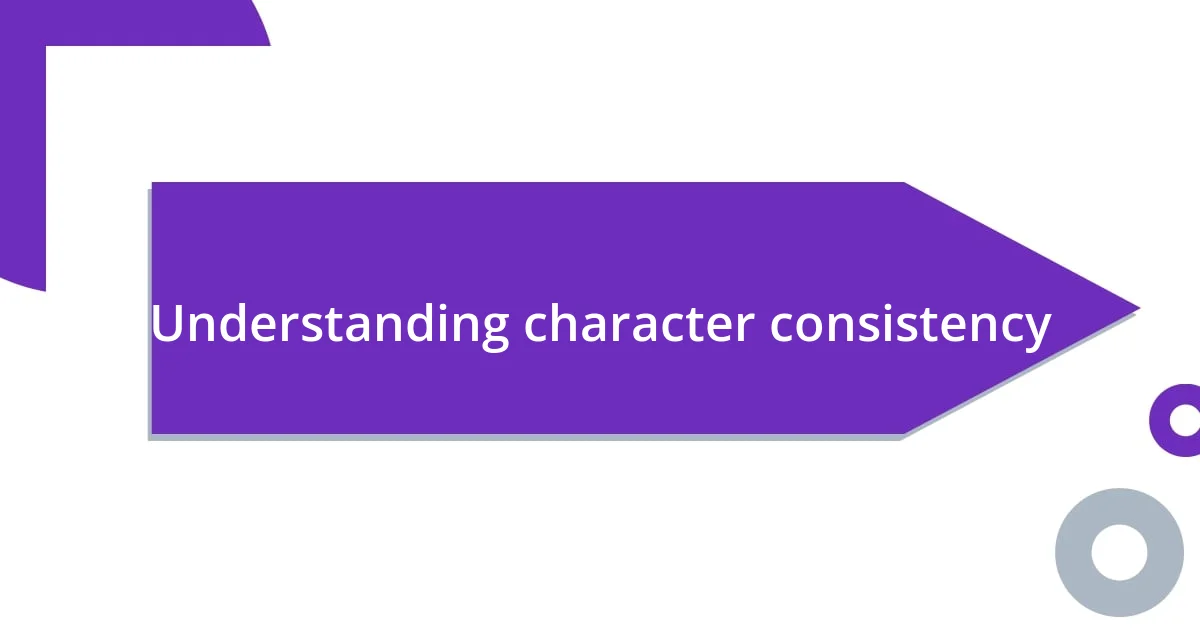
Understanding character consistency
Character consistency revolves around the idea that our behaviors, reactions, and values remain stable over time. I remember a time when I struggled to maintain my commitment to honesty during a challenging personal situation. It struck me that my decisions should reflect my core values, even when faced with temptation. How can we expect others to trust us if we waver in our principles?
It’s fascinating to consider how our past experiences shape our character consistency. For instance, I learned through my experiences in group projects that reliable teammates often drive collective success. It made me realize that being consistent isn’t just about personal integrity; it’s also about creating environments where others feel valued and supported. Have you thought about how your consistency—or lack thereof—affects those around you?
When we genuinely embody our beliefs, we build a certain depth of character that resonates with others. I often reflect on how moments of vulnerability can reveal the strongest aspects of our character. Isn’t it interesting how the consistency displayed during tough times often defines our true selves? Engaging with this idea not only challenges us to be better individuals but also inspires those around us to strive for the same ideals.
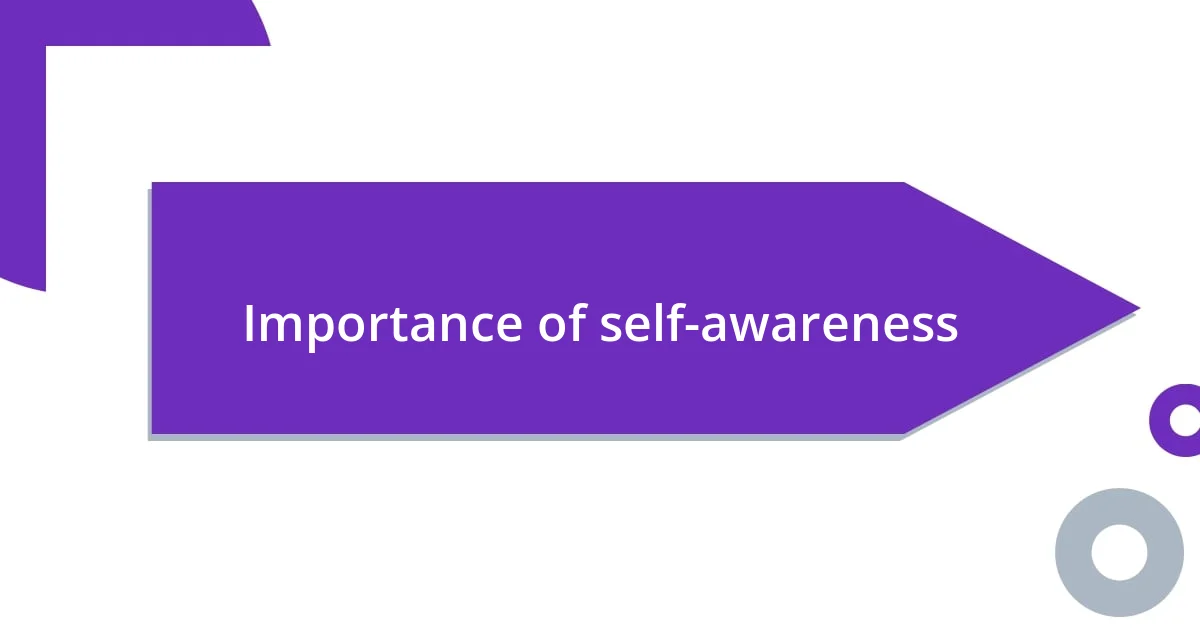
Importance of self-awareness
Self-awareness is invaluable in understanding our character consistency. I once had a revelation during a heated discussion with a friend; I realized I was more concerned with winning the argument than staying true to my values. In that moment, I understood that self-awareness isn’t just about recognizing our strengths and weaknesses; it’s about being consciously aware of how our actions align or misalign with our core beliefs. This clarity fosters a deeper understanding of ourselves, which I find pivotal for maintaining integrity.
Here are some key aspects to consider about self-awareness:
- Reflective Practice: Regularly reflecting on experiences can help us identify patterns in our behavior, allowing for better alignment with our values.
- Emotional Regulation: Being aware of our emotions helps us respond thoughtfully rather than react impulsively, maintaining our integrity during challenging situations.
- Honest Evaluations: Self-reflection encourages us to engage in honest self-evaluation, facilitating personal growth and improvement.
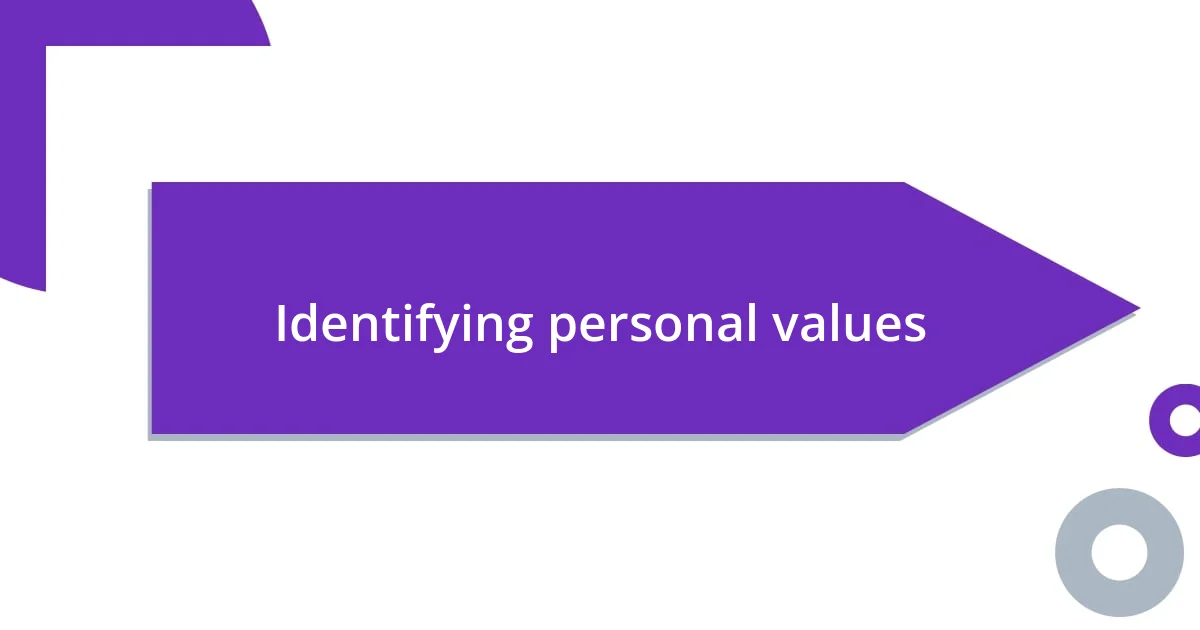
Identifying personal values
Identifying personal values is a crucial step in understanding our character consistency. There was a time when I felt lost, unsure of what truly mattered to me. After some soul-searching, I found that my core values included honesty, compassion, and growth. Recognizing these values allowed me to make decisions that align with who I am at my core. Isn’t it liberating to know that your actions stem from a foundation you truly believe in?
In my experience, identifying personal values isn’t just an introspective exercise; it’s a practical guide for everyday living. For instance, during a career change, I revisited my values and realized I needed a role that emphasized creativity and collaboration. This clarity not only guided my decisions but also provided a sense of fulfillment in my work. Have you ever experienced a similar revelation that shaped your path?
To help you visualize the process, I’ve created a simple comparison table outlining some common personal values and their potential effects on decision-making:
| Personal Value | Effect on Decisions |
|---|---|
| Honesty | Promotes transparency in communication and builds trust. |
| Compassion | Encourages empathy in relationships and promotes supportive actions. |
| Growth | Inspires a willingness to learn and adapt in various situations. |
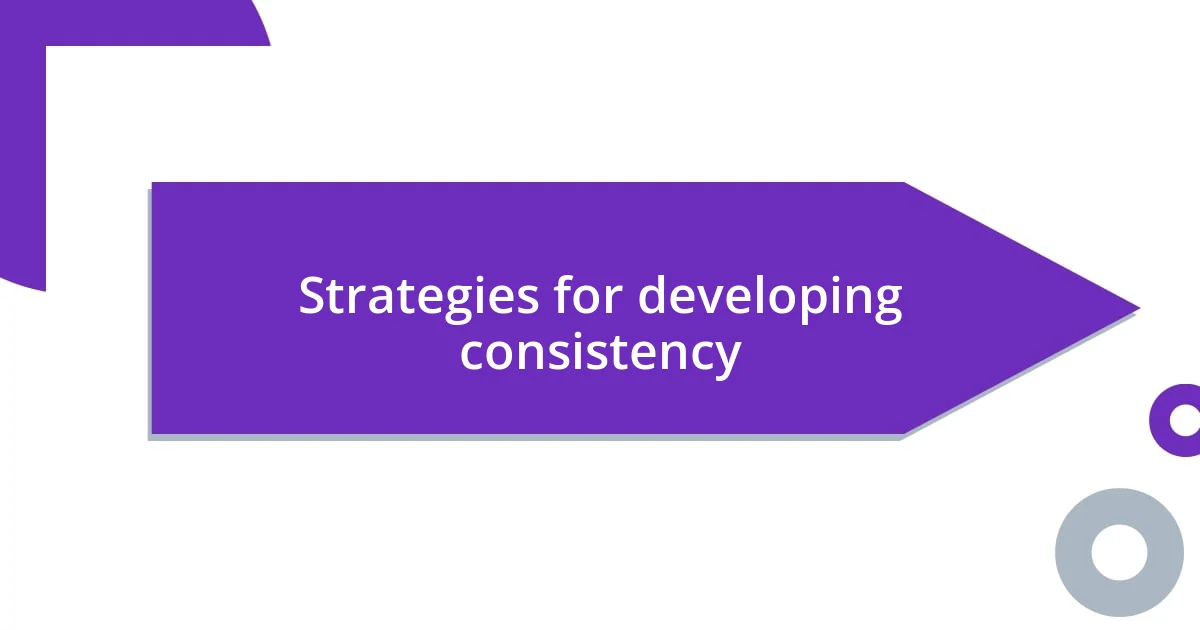
Strategies for developing consistency
When it comes to developing consistency, setting clear intentions is a game changer. I remember a time when I approached a new fitness routine without a defined goal. I quickly lost motivation and fell off track. Now, I believe that having a specific intention—whether it’s improving health or boosting energy—provides a roadmap, steering my actions toward consistency over time. Have you ever felt adrift without a clear purpose?
Another effective strategy is creating routines that reinforce our desired behaviors. I established a morning ritual that includes journaling and meditation. This practice not only centers me but also reminds me of my values every day. It’s remarkable how little habits can create a ripple effect in our lives. What daily rituals do you have that keep you aligned with your true self?
Lastly, accountability plays a crucial role in maintaining character consistency. Sharing my goals with trusted friends or mentors has helped me stay committed. When I know someone is rooting for me, it adds an extra layer of motivation. I often find that discussing my struggles and victories openly creates an honest dialogue that fosters growth. How have the people in your life supported you on your journey?
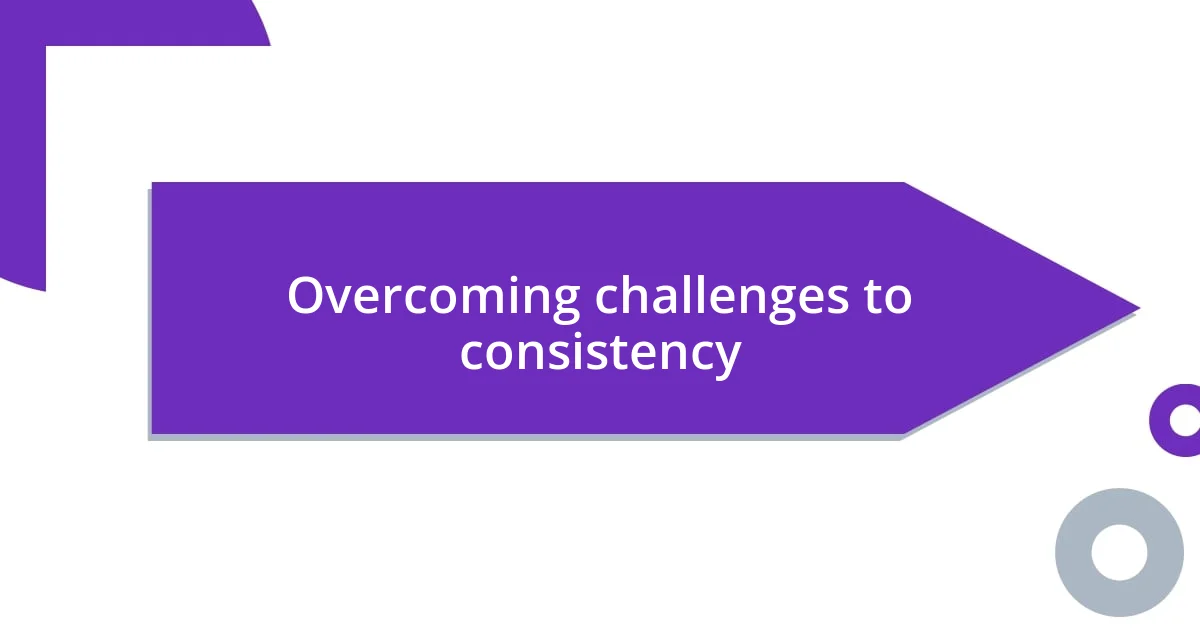
Overcoming challenges to consistency
Overcoming challenges to consistency often requires confronting the discomfort of change. I remember vividly when I first tried to establish a healthier diet. The initial weeks were incredibly tough; I craved my old favorites and felt frustrated with the restrictions. Yet, I learned that my discomfort was a signal for growth. What if I embraced that struggle instead of avoiding it? Acknowledging it became part of my journey, and over time, my cravings shifted to healthier choices as I redefined my palate.
Emotional resilience is also a key factor in maintaining consistency. I have faced moments of self-doubt that made me question my progress. During challenging times, I turned to my journal as an outlet. Writing about my feelings not only provided a release but also helped me track my growth. Isn’t it fascinating how documenting our journey can illuminate how far we’ve come? This practice turned my hurdles into stepping stones, reinforcing my commitment to my values despite the setbacks.
Another challenge lies in external pressures that can lure us away from our desired path. I recall attending a social gathering where unhealthy eating was the norm. It was tempting to indulge and fit in, but I chose to bring a dish that aligned with my new lifestyle. When others expressed interest in my choices, it sparked enriching conversations about healthy living. Have you ever noticed how your decisions can inspire others? This experience taught me that consistency doesn’t mean isolation; rather, it can enrich connections and motivate those around us, creating a community of support.
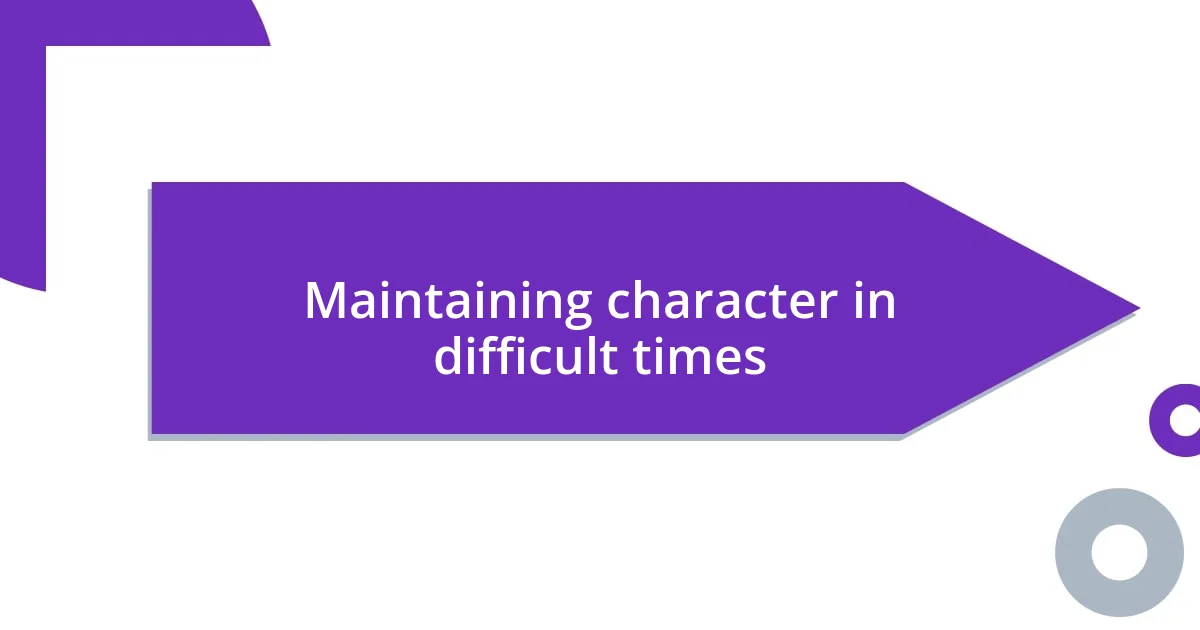
Maintaining character in difficult times
Navigating difficult times can feel like walking a tightrope. I vividly remember a period when I faced professional setbacks that shook my confidence deeply. During those moments, I clung to my core values like a lifeline; they reminded me of who I am and what I stand for, even when the world around me felt unstable. How often do we rely on our inner compass during life’s storms?
It’s often in the face of adversity that we’re challenged to define our character. There was a time when a friend lured me into compromising situations that didn’t match my values. I remember feeling torn between wanting to fit in and staying true to myself. Ultimately, I chose to prioritize my integrity, which reinforced my commitment to character consistency. Have you faced a moment when you had to stand your ground, despite feeling the pressure to conform?
As I reflect on those tough times, I recognize that character is forged in the fires of adversity. There were nights I would lie awake, uncertain and anxious about my decisions, but it was in those quiet moments of introspection that I discovered resilience. I learned that maintaining my character isn’t about perfection—it’s about persistence in the face of challenges. Isn’t it empowering to think that each struggle contributes to our growth and shapes us into who we aspire to be?
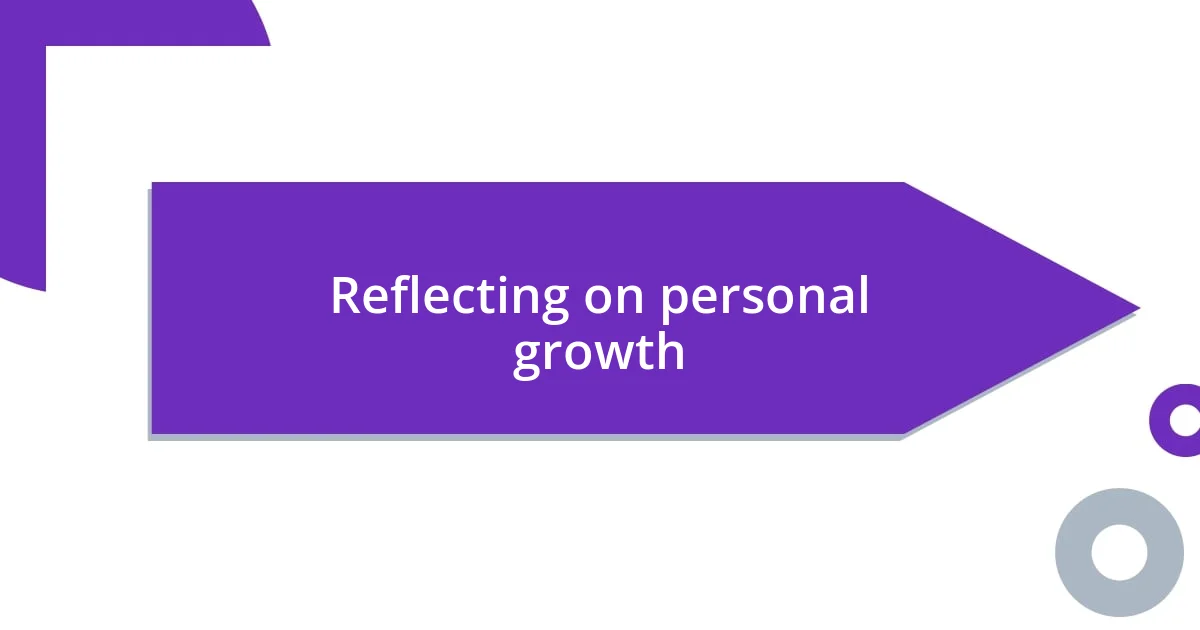
Reflecting on personal growth
Reflecting on personal growth often invites us to look back at the changes we’ve undergone. I recall a time when I doubted whether I was capable of pursuing my passion for art. Each stroke I painted felt like a conversation with my inner self, revealing layers of vulnerability I hadn’t acknowledged before. Have you ever considered how your passions might serve as mirrors, reflecting not just your skills but your innermost journey?
The process of growth can feel overwhelming, but breaking it into smaller, intentional goals has been a game changer for me. I started setting weekly objectives, and even something as simple as drawing for just 10 minutes a day became my foundation. I noticed that celebrating those small wins created a sense of momentum. When was the last time you acknowledged the power of a seemingly tiny step in your own journey?
Looking back, I realize that embracing feedback played a crucial role in my development. Early on, critiques used to feel like personal attacks, but I learned to see them as opportunities for improvement. There’s a certain beauty in vulnerability, isn’t there? Accepting constructive criticism not only enhanced my skills but also deepened my understanding of myself, turning each piece of art into a testament to my growth.














